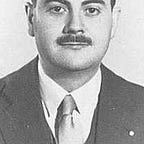Essay
One More, Help Me Get One More
Work like who? Be like who? What are the options in display? Who offers them? Are we at war? Will I have good fortune? Is there anything I can do? In front of us there are two signs, two alternatives for today. Some are false dichotomies, other choices we have to make. There is almost always a third way hidden deep within us. Few know it, few find it
War
Second World War. A battle between two opposing conceptions of life and freedom. Hundreds of thousands of volunteers, more than 75 million dead. Two antagonists: our current reality and another that we do not know what it would have been like if the Nazis had won. Soldiers of many nationalities. In each life a story marked by fire by bullets and pain. Pages torn from biographies, shattered dreams, dismembered bodies. Fury and rage, blood, sweat and tears. Mixed in the mud of belligerence, cold and heat coexisted, human miseries and supernatural hope, the clear blue sky and dense and feverish gasoline.
How did the young people of that time have to act before such a disproportionate endeavor? The options were only two: stay home to wait or go out to fight to kill or be killed. There was nothing in between. Cowardice or daring were the choices according to the observer’s perspective. Another of the many, many false dichotomies that everyday life presents us with. Faced with the madness of war, of death, there seems to be nothing more to do.
Third way
For those who are lived by time, those with a bent neck and existential pessimism, the options are always given from the outside. Their life is controlled by others. Their decisions limited by others. For the time friend, the vital taster, the behavioral optimist, options emerge from within. Their essential mission screams from their gut what they have to be and do. Nothing and nobody can delimit them. They are freer than freedom.
In this turbulent context, evading the false dichotomies proposed, breaking the schemes, knowing there be dragons, prejudices and colleagues in arms against him, a man answered, when asked ‘Did you figure this war is just going to fit in with your ideas?’, with a soft but firm voice: ‘With the world so set on tearing itself apart, it don’t seem like such a bad thing to me to wanna put a little bit of it back together.’
That integral and peaceful person who chose to go to the center of the battle alongside everyone else was named Desmond Thomas Doss, who served as a combat medic in the Battle of Okinawa. He did not go to kill or die, but to save or die. He was beyond the alternatives, and that is for few. He was consistent in everything: ‘You’ re a conscientious objector and you join the army?’ Yes, he wanted to help: ‘I have the energy and the passion to serve as a medic! While everybody else is taking lives I’m gonna be saving them.’ He saved 75 people and became the only conscientious objector to receive the Medal of Honor, the most important and prestigious decoration in the United States of America, for his actions during the war.
With the world so set on tearing itself apart, it don’t seem like such a bad thing to me to wanna put a little bit of it back together.
The film Hacksaw Ridge (2016) directed by Oscar winner Mel Gibson tells the story of Desmond T. Doss (Andrew Garfield) this unlikely hero who 76 years later continues to surprise those who come to his life. Approaching Doss is not necessarily being comfortable. In my case, I am impressed by how this sentence that says: ‘I don’t know how I gonna live up with myself if I don’t stay true to what I believe’ bothers me. He, who was offered to choose from only two options, the one who broke the mold, the one who didn’t fit into the army, the one about which Sergeant Howell (Vince Vaughn) said: ‘I have seen stalks of corn with better physiques’, that pin pricks my soul today .
Fortune
Incredibly Doss did not die in the heat of battle, unarmed and fragile as he was. He extraordinarily survived, not without few physical sequelae. He amazingly could have saved a single soldier, or two or three and his inadmissible feat would be just as glorious. But not! He was not content, nor did he slow his momentum or his will falter. With each rescued, already exhausted and without strength, he only said like a mantra: ‘Please Lord, help me get one more. Help me get one more… One more’.
The dice of fate in the hands that shook the cup, were favorable. Why, how, what for? Open palms know the answers. They are many and complex, varied and immeasurable answers, but one thing is for sure. One answer is obvious. Those who manage to make friends with time, those who savor their days with optimism, faith and hope, those who follow the essential mission that shouts from its guts what it has to be and do, to those, nothing and nobody can delimit them. They are freer than freedom. Greater than love. Larger than life.
Captain Glover (Sam Worthington) tells Desmond near the end of the Hacksaw Ridge movie: ‘Most of these men don’t believe the same way you do, but they believe so much in how much you believe. And what you did on that ridge, it’s nothing short of a miracle, and they want a piece of it.’
The next day, before the battle, the unit waits for the ‘coward Doss’ to finish his prayers to go to the struggle. Once ready the captain tells them: ‘Let’s go to work!’
Let’s go to work! But let’s not fall into false dichotomies. Let’s work like Doss.
